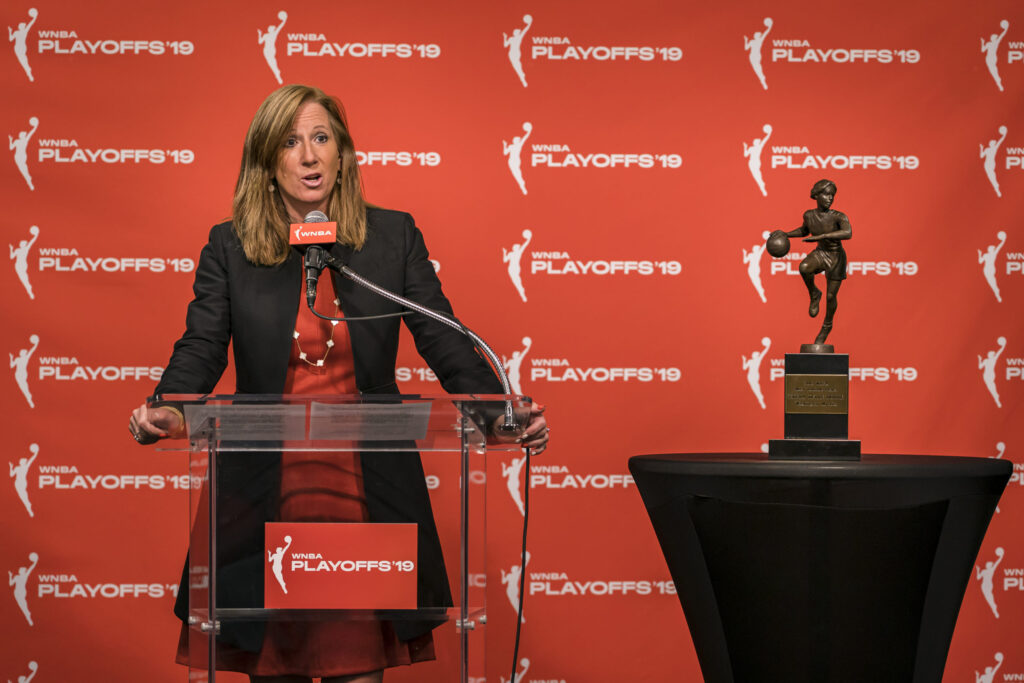🏀 The WNBA’s Civil War: Caitlin Clark, Angel Reese, and the League’s Identity Crisis
Just a week ago, it was all cheers and celebration for the Indiana Fever. Caitlin Clark dropped a historic triple-double in a 35-point beatdown over the Chicago Sky, and fans were riding high on what looked like the start of a new WNBA era. Clark was the face of the future — drawing record crowds, dominating headlines, and sparking excitement unseen in women’s basketball in decades.
But in a matter of days, everything changed.

What began as a routine game quickly spiraled into a league-wide spectacle of finger-pointing, accusations, and chaos. The supposed catalyst? A foul — yes, just a foul — committed by Clark against Angel Reese. A moment that in any other league would be brushed off as competitive intensity is now the beating heart of a scandal threatening to fracture the WNBA’s foundation.
From Flag to Firestorm
Angel Reese initiated the tension with a physical nudge to a Fever player, but when Clark responded with a textbook foul — nothing dirty, nothing malicious — the outrage machine kicked into overdrive. Suddenly, headlines screamed racism, the league launched investigations, and fans were accused of inappropriate behavior with no evidence. Just noise. Just speculation.
Clark, the very athlete reigniting interest in the league, was painted not as a rising star but as a polarizing figure, and her team, the Indiana Fever, labeled the villains. Even worse? Their own coach, Tyler Marsh, didn’t echo the accusations being thrown around. He said he found out about the supposed slurs the same way the rest of us did — online.
The League’s Biggest Problem: Its Own Success
Instead of rallying around the Fever and Caitlin Clark — whose games are selling out arenas and sending merchandise sales into the stratosphere — the WNBA seems more focused on controversy than competition. The league, once desperate for relevance, now finds itself biting the very hand that’s feeding its revival.
And that hand is Caitlin Clark.
Her fans are loud, proud, and passionate — the kind of loyal following any league would beg for. But in the WNBA? They’re being blamed for everything from toxicity to triggering league investigations. Meanwhile, players like Angel Reese, known as much for theatrics as athleticism, are positioned as media martyrs, shielded from criticism and bolstered by narratives that ignore their own on-court provocations.

A League at a Crossroads
Let’s not sugarcoat it: the WNBA has an identity crisis. Does it want to grow or gatekeep? Embrace a new generation of fans, or silence them because they don’t follow unwritten rules? Celebrate rising stars like Clark — who’s selling out games in cities that used to give away tickets for free — or protect a status quo that hasn’t moved the needle in years?
The Indiana Fever aren’t just winning games; they’re winning attention. Yet instead of support, they face scrutiny. And that scrutiny isn’t rooted in basketball — it’s rooted in discomfort. Discomfort with change. Discomfort with shifting power. Discomfort with the uncomfortable truth: without Caitlin Clark and the Fever, the WNBA might still be playing in front of half-empty arenas.
The Bottom Line
This isn’t about one foul, or even one player. It’s about whether the WNBA will embrace progress or sabotage it. Whether the league will capitalize on the momentum or collapse under its own infighting. Clark is doing her part — on the court, in the headlines, and in the hearts of fans. Now the league must decide if it’s ready to follow her lead, or if it would rather cling to a crumbling narrative that keeps women’s sports small.
Because while some try to dim the Fever’s flame, they’re only making it burn brighter.
The real drama isn’t on the court. It’s what’s happening behind the scenes — and how much longer the fans will tolerate it.

